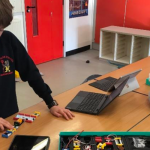Daily reading habits in children may be more influential for the healthy development in children. Experts claim that reading improves social and linguistic skills and supports cognitive development. There are some ways families and teachers can try to make reading a habit in young children. As technology merges into our everyday life, they can incorporate new technological innovations to encourage reading habits.
Benefits Of Reading Habit in Kids
Expands Vocabulary: Children learn words through getting exposing them. So, reading enables your child to come across different words and spellings. If you read to your child aloud, their brains can also learn the correct pronunciations of words.
Improves Communication Skills: This one may be a bit interrelated to the previous paragraph, as our ability to structure and comprehend meaningful and complex sentences stems from our vocabulary. So, children with good reading habits can express their feelings ad communicate with others more easily.
Increases Attention Span: Some children can have a pretty short attention span as a result of new media types which urge shorter and catchier media. However, a short attention span may cause many difficulties in kids’ later lives. Reading removes overstimulation and helps children to focus on an activity or a subject for a more extended period.
Boosts Your Child’s Imagination and Creativity: Books take the reader on a journey in the world of imagination. Children can explore life from the eyes of the book characters like a child, a racoon, a tree, or even a car. They can empathise with those characters and build creative ideas. Those fictional worlds enhance children’s creativity as they urge them to use their imagination.
Develops Your Child’s Analytical Skills: Reading children tend to produce more original opinions and question what they read, learned and were told. In addition, books give your child various scenarios through which they can explore different aspects of life. So, reading stimulates children’s analytical thinking skills.
Triggers Curiosity: Children learn about different places and cultures worldwide by reading books. The more they know, the more they grow curious about the world outside their home. Reading triggers children’s curiosity and helps them try to explore the world more.
7 Ways to Develop Reading Habit in Kids
- Read for Them
You don’t need to wait for your children to start reading to develop a reading habit in your children. On the contrary, building a reading habit as early as possible tends to be more effective for a lifelong habit. You can sit by them every day for an hour and read their favourite stories to them. Any time would be good, but bedtime story time may be the best choice. This storytime can help your child to unwind at the end of the day as this cosy family activity gives them comfort and a sense of security.
- Read With Expressions
Children can lose interest in a story told monotonously. You can change your tone, voice, and pronunciation according to the way a character would speak. You can also read the story with dramatic expressions to keep your children’s attention on you. Visualising the story in front of them helps them follow it and understand the word meanings.
- Be a Role Model
Children take so many habits from their parents or elders in the family by simply watching them. So, if you make reading a habit yourself, it would be easier for your children to take this example and apply it to themselves. Make sure to create a time for yourself to sit and read even if your children play, draw, or watch something by themselves. Your being a role model will encourage them to read as well.
- Create a Reading Space
Building a reading habit may take a long time for your child because children need time to discover what they like and don’t like. Create a reading corner decorated with big pillows and a comfy sitting area so your child enjoys spending time there. Also, having a library with different kinds of books at home encourages your kids to explore and discover their interests. Finally, ensure your children can safely reach their books so they can get a book if they want, even when you are not around.
- Visit Local Libraries
Children get excited when they visit places because that means a new environment where they would have lots of things to explore. So make taking trips to libraries an activity with your children. They can discover new types of books, try new genres, and build a habit of picking up books to reads. You can also check out your local library’s programs to see if they have book clubs or story hours for kids.
- Let Your Child Pick Their Books
Making kids love reading is one of the most necessary steps for building a reading habit. Children wouldn’t want to keep reading a book if they don’t like or aren’t interested in it. So, first of all, try to find the books they like. This way, they would want to read more as they will have a fun and engaging time.
- Sign Your Kids Up For Book Clubs
Apart from the parents as role models, children also get influenced by their peers. If they have people around the same age with whom they can talk about books, their interests, and comics, they may get more motivated to read. That love for reading can quickly turn into a habit in future. Book clubs can be particularly beneficial for homeschooling students as they can connect with other students in their age group and get encouraged to build a reading habit.
How Does Technology Affect Reading Habits in Kids?
21st-century technology changed our reading habits drastically. It introduced a variety of reading platforms while there were only physical books, newspapers, etc., in the past. In this decade, we are experiencing a shift in reading habits from traditional to digital media. Some people believe that technology has adverse effects on the reading habits of students. They think digital media makes managing screen time for kids difficult. However, it has many benefits on children’s reading habits and learning experience as long as families and teachers use technology correctly and effectively. Applying innovative methods to education makes them better technology users with higher capabilities of media literacy.Digital media creates a diverse catalogue of e-books, interactive books, and audiobooks. So rather than replacing print books, it complements and supports them. Innovative technologies greatly support children’s engagement with stories as they develop new ways to interact with the text and narrative. A study in 2014 argues that digital media usage for younger children has been increasing as digital media technologies become more accessible each day. Although there is still a majority of people preferring print books, more and more people have started to prefer digital books for different reasons. Many parents whose child choose digital books say that their child enjoys using digital devices. Some say they like interactive books, while some say they like additional features of digital media. This way, embracing Edtech transforms teaching: Edtech contributes various features that help students with disabilities and makes learning a different journey.



